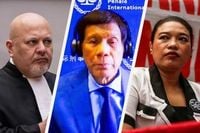In a development that has sent ripples through international legal and political circles, the International Criminal Court (ICC) has officially disqualified its chief prosecutor, Karim Khan, from the high-profile case against former Philippine President Rodrigo Duterte. The decision, released in redacted form on October 14, 2025, follows mounting concerns about Khan's prior involvement with victims of Duterte’s controversial “war on drugs”—a campaign that has been under ICC scrutiny for alleged crimes against humanity.
The ICC’s Appeals Chamber, comprising Judges Luz del Carmen Ibáñez Carranza, Tomoko Akane, Solomy Balungi Bossa, Gocha Lordkipanidze, and Erdenebalsuren Damdin, reached a unanimous verdict on October 2, 2025. Their ruling did not find any actual bias on Khan’s part but concluded that his earlier, multifaceted role as a legal representative for victims created a "reasonable appearance of bias." According to the ruling, “A reasonable observer could conclude that the Prosecutor may have formed an opinion on the case against Mr. Duterte during his involvement… that could adversely affect his required impartiality.”
Khan’s involvement dates back to 2018, when he filed an Article 15 communication on behalf of the Philippine Human Rights Commission. This submission urged the ICC to open an investigation into Duterte’s anti-drug campaign. The judges highlighted that Khan’s activities were "significantly intense and multifaceted," involving investigative work in the Philippines, interviews with potential witnesses, and recommendations that specifically referenced Duterte’s criminal liability. As reported by NewsWatch Plus, the court found this history sufficient to warrant disqualification under Article 42(7) of the Rome Statute and Rule 34(1)(c) of the ICC’s procedural rules.
Despite the gravity of this shake-up, the ICC was quick to clarify that the investigation into Duterte’s alleged crimes continues without interruption. Deputy Prosecutor Mame Mandiaye Niang has been leading the case since early 2025 and signed the arrest warrant application for Duterte in February. Court spokesperson Fadi El Abdallah emphasized on X that "the disqualification would not have an impact on the case against Duterte, which would continue to be led by a deputy prosecutor." Khan himself had voluntarily taken a leave of absence as far back as May 2025, pending an unrelated investigation into allegations of sexual misconduct, and did not participate in the review of evidence or the preparation of the warrant application.
The roots of the ICC’s probe into the Philippines stretch back to 2018, when then-prosecutor Fatou Bensouda launched a preliminary examination into the government’s anti-drug operations. The investigation was elevated to a full probe in 2021. In 2023, the ICC rejected a request from Manila to defer the investigation, citing insufficient efforts by Philippine authorities to ensure domestic accountability for the thousands of deaths reported during the crackdown.
Duterte’s legal team had been pushing for Khan’s disqualification for months. Defense lawyers argued that Khan’s "ethical obligations to his former clients were irreconcilable with his duties as chief prosecutor," and warned that "Karim Khan’s preconceived views as to Mr. Duterte’s guilt contaminated the investigation that he later supervised." Prosecutors, for their part, countered that "the mere fact of the Prosecutor’s involvement in a prior factual investigation cannot suffice for disqualification." Yet, the five-judge panel ultimately sided with the defense on the appearance of bias, even as they stressed that no actual bias had been demonstrated.
On the ground, the stakes could hardly be higher. Duterte, who was arrested in the Philippines in March 2025 and transferred to The Hague, faces charges of crimes against humanity stemming from his leadership of the country’s war on drugs. The crackdown, which began when Duterte was mayor of Davao and continued through his presidency, resulted in a death toll that remains fiercely contested: the Philippine National Police report more than 6,000 deaths, while human rights groups claim the figure could be as high as 30,000.
The legal drama has been further complicated by Duterte’s health. Last month, the ICC postponed a pretrial hearing over concerns about the former president’s fitness to stand trial. Duterte’s lawyers filed a motion in August seeking an indefinite delay, arguing that their 80-year-old client was "not fit to stand trial." Just last week, ICC judges rejected Duterte’s request for release from detention, citing concerns that he might refuse to return for trial or intimidate witnesses if granted freedom.
Observers in the Philippines and abroad are watching closely. The case has become a lightning rod for debates about international justice, national sovereignty, and the legacy of Duterte’s presidency. While supporters of the former president insist that the anti-drug campaign was a necessary response to rampant criminality, critics—including many international human rights organizations—see it as a brutal campaign marked by extrajudicial killings and impunity.
Within the Philippines, reactions to the ICC’s latest move have been mixed. Some legal experts described Khan's participation in the case as "not minimal, but not decisive," according to a report by ABS-CBN, the country’s leading media and entertainment company. The Office of the Prosecutor, for its part, reiterated its commitment to impartiality and independence, stating: “Victims and survivors in the Philippines deserve justice and accountability.”
It’s a sentiment echoed by many, though the road ahead remains uncertain. The ICC’s decision to disqualify its own chief prosecutor—while rare—underscores the institution’s commitment to avoiding even the appearance of partiality. At the same time, the court’s insistence that the investigation will continue without delay signals determination to see the case through, regardless of high-profile personnel changes.
As the legal process grinds on, the world will be watching not just the fate of Rodrigo Duterte, but the ICC’s ability to deliver justice in a case that has come to symbolize the global fight against impunity for state-led violence. For the families of victims and defenders of human rights in the Philippines, the stakes could not be clearer—or more urgent.


